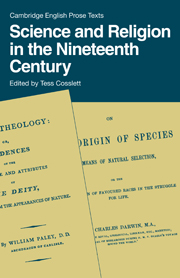Book contents
- Frontmatter
- Contents
- Editorial note
- Introductory essay
- 1 WILLIAM PALEY, Natural Theology (1802), Chapters 1–3
- 2 ROBERT CHAMBERS, Vestiges of the Natural History of Creation (1844), Chapter 14, ‘Hypothesis of the Development of the Vegetable and Animal Kingdoms’
- 3 HUGH MILLER, The Testimony of the Rocks (1857), Lecture Fifth, ‘Geology in its Bearings on the Two Theologies’, Part I
- 4 CHARLES DARWIN, On the Origin of Species (1859), Chapter 14, ‘Recapitulation and Conclusion’
- 5 CHARLES GOODWIN, ‘On the Mosaic Cosmogony’, Essays and Reviews (1860)
- 6 LEONARD HUXLEY, Life and Letters of Thomas Henry Huxley (1903), vol. 1, Chapter 14, ‘1859-1860’
- 7 CHARLES DARWIN, The Descent of Man (1871), Chapter 21, ‘General Summary and Conclusion’
- 8 JOHN TYNDALL, ‘The Belfast Address’, Nature, 20 August 1874
- 9 FREDERICK TEMPLE, The Relations between Religion and Science (1884), Lecture VI, ‘Apparent Collision between Religion and the Doctrine of Evolution’; and Lecture VIII, ‘The Conclusion of the Argument’
- Notes
- Select booklist
2 - ROBERT CHAMBERS, Vestiges of the Natural History of Creation (1844), Chapter 14, ‘Hypothesis of the Development of the Vegetable and Animal Kingdoms’
Published online by Cambridge University Press: 18 January 2010
- Frontmatter
- Contents
- Editorial note
- Introductory essay
- 1 WILLIAM PALEY, Natural Theology (1802), Chapters 1–3
- 2 ROBERT CHAMBERS, Vestiges of the Natural History of Creation (1844), Chapter 14, ‘Hypothesis of the Development of the Vegetable and Animal Kingdoms’
- 3 HUGH MILLER, The Testimony of the Rocks (1857), Lecture Fifth, ‘Geology in its Bearings on the Two Theologies’, Part I
- 4 CHARLES DARWIN, On the Origin of Species (1859), Chapter 14, ‘Recapitulation and Conclusion’
- 5 CHARLES GOODWIN, ‘On the Mosaic Cosmogony’, Essays and Reviews (1860)
- 6 LEONARD HUXLEY, Life and Letters of Thomas Henry Huxley (1903), vol. 1, Chapter 14, ‘1859-1860’
- 7 CHARLES DARWIN, The Descent of Man (1871), Chapter 21, ‘General Summary and Conclusion’
- 8 JOHN TYNDALL, ‘The Belfast Address’, Nature, 20 August 1874
- 9 FREDERICK TEMPLE, The Relations between Religion and Science (1884), Lecture VI, ‘Apparent Collision between Religion and the Doctrine of Evolution’; and Lecture VIII, ‘The Conclusion of the Argument’
- Notes
- Select booklist
Summary
Robert Chambers, a publisher and amateur geologist, brought out the Vestiges anonymously in 1844, and it was an immediate popular sensation, going through four editions in the first six months, and twenty editions up to 1860. Vestiges was the first full-length presentation of an evolutionary theory of species, in English. Lamarck's theory was known, but chiefly through Charles Lyell's refutation in The Principles of Geology (1830-3). Chambers' desire for anonymity shows that he knew how controversial any such theory would be, and he was fiercely attacked for irreligion and immorality. Here is an example of this reaction to Vestiges from the Rev Adam Sedgwick, one of its most outspoken critics:
If the book be true, the labours of sober induction are in vain; religion is a lie; human law is a mass of folly, and a base injustice; morality is moonshine; our labours for the black people of Africa were works of madmen; and man and woman are only better beasts!
(J. Clark and T. Hughes, Life of Sedgwick (1890), PP. 83–4)Chambers' inclusion of man in his evolutionary scheme was seen as an especial affront, substituting descent from animal origins for direct creation by God.
But it is also important to realise that Adam Sedgwick was Professor of Geology at Cambridge, an eminent and respected scientist working in the tradition of natural theology.
- Type
- Chapter
- Information
- Science and Religion in the 19th Century , pp. 46 - 66Publisher: Cambridge University PressPrint publication year: 1984



